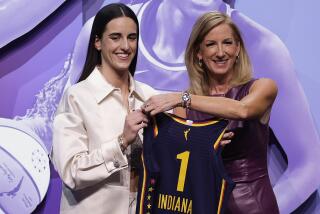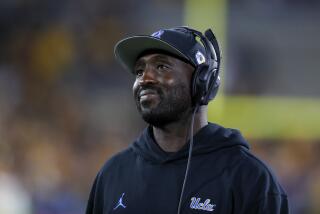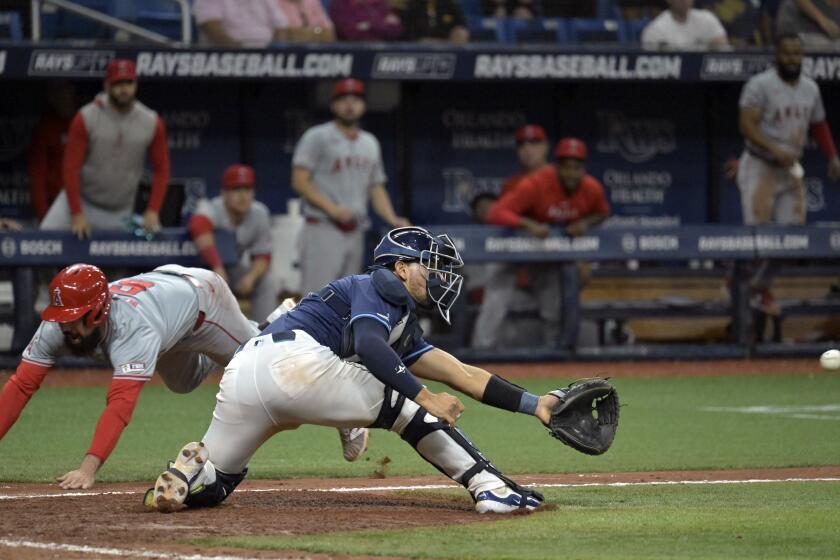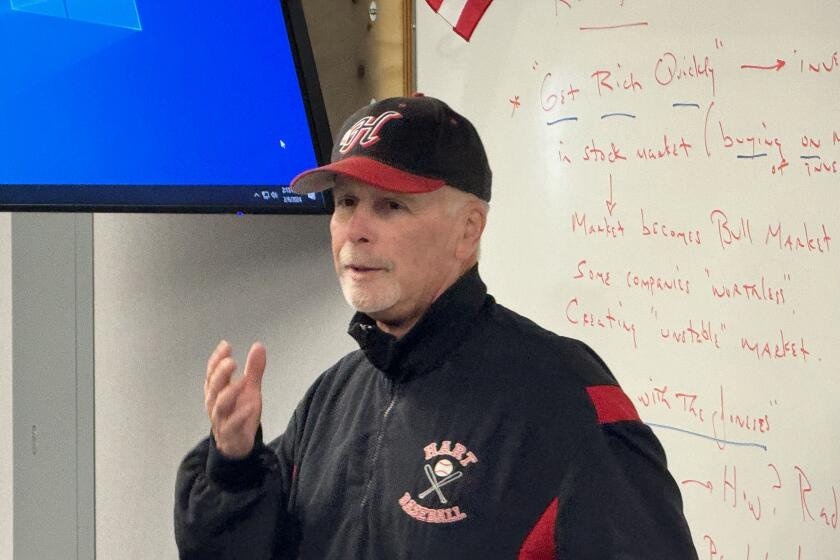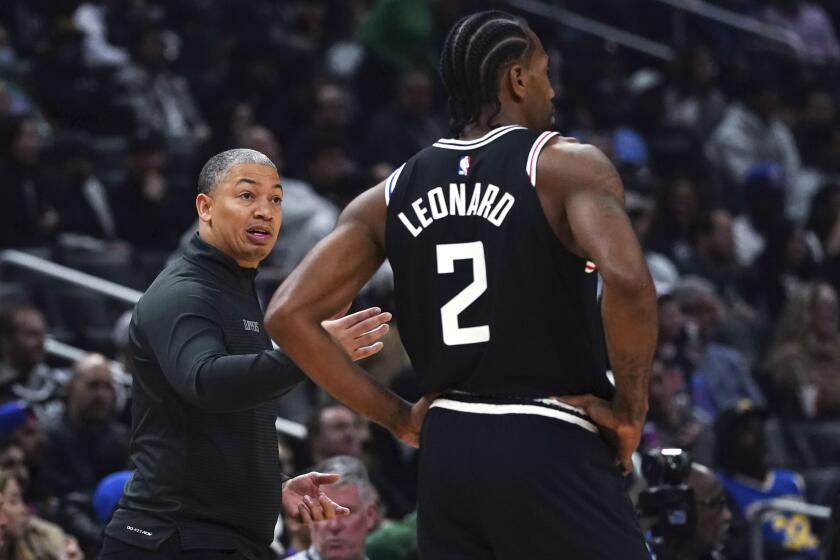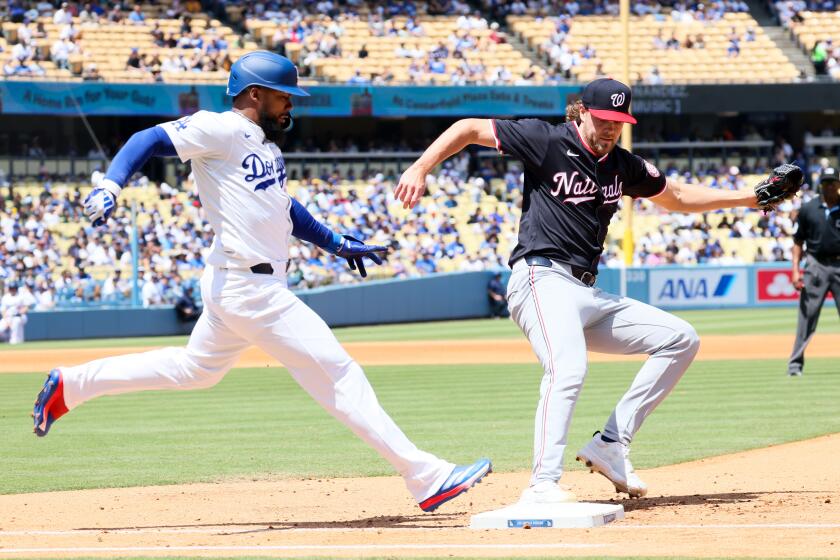Details of Cochell’s Use of Racial Slur Disclosed
Larry Cochell was one of college baseball’s biggest winners in nearly four decades of coaching at several schools, including Cal State Fullerton and Cal State Los Angeles, but his use of a racial epithet may have ended an otherwise distinguished career.
Cochell, 65, resigned as Oklahoma’s coach Sunday after using a slur to describe one of his African American players during off-camera interviews with ESPN last week.
The network reported Friday that Cochell, who is white, made the remarks in discussing freshman outfielder Joe Dunigan III during separate conversations with broadcasters Gary Thorne and Kyle Peterson before the Sooners’ televised game last Tuesday at Wichita State.
Cochell said to Thorne: “There are honkies and white people, and there are niggers and black people. Dunigan is a good black kid,” and told Peterson, “There’s no nigger in him.”
Don Skwar, an ESPN senior news editor, said both interviews were on the record though they weren’t on the air.
Thorne and Peterson did not respond to interview requests Monday. The network said Peterson would work tonight’s San Diego State-Cal State Fullerton game at Fullerton.
Skwar said Thorne was “taken aback” by Cochell’s comments and that Peterson was “shocked.” They realized the coach had used the same slur to both when they met up Thursday for a televised game the next night at Oklahoma, an ESPN spokesman said. They then contacted network management.
Cochell, who won the 1994 national title with the Sooners, was suspended before Friday’s game against Nebraska. He resigned Sunday morning. He has coached at seven colleges in a 39-year career and reached the College World Series with the Sooners, Fullerton and Oral Roberts -- making him one of only three coaches to take three schools to Omaha.
Efforts to reach Cochell on Monday failed, but in Monday’s editions of the Daily Oklahoman, he said: “I don’t know why I said it. I have never in my life used that kind of language. It was a phrase I heard a long time ago, and it just came out.”
The player’s father told the newspaper that Cochell had apologized, adding that the coach had “treated us like family” and was “a Christian man.”
“We all say things that we don’t mean,” Joe Dunigan Jr. said, “and I hope people ... don’t color him as a racist because he made a mistake.”
Cochell has 1,330 victories, eighth among college baseball’s winningest coaches.
Acquaintances of Cochell describe him as a man of faith who bans the use of expletives in his team’s dugout.
George Henderson, a University of Oklahoma professor of human relations, has known Cochell for more than a decade and cannot understand why his friend used such language.
“I was shocked,” said Henderson, who is black. “I said surely there must be some mistake here. ... I was angry initially at Larry for doing something like that.”
Henderson said he spoke with Cochell over the weekend and doesn’t consider him racist. He said the coach realized “he would have to pay” for his remarks.
“It just didn’t make sense to me because of the things that I know he did outside the sport,” Henderson said. “He would help students get into graduate school. Not athletes, just students. If you’re a racist, then why are you helping these black students?”
USC Coach Mike Gillespie, who is white, said no coach can expect to keep his job if he or she talks about an athlete in that manner, no matter how the statement was intended.
“I do not think he is a prejudiced person or anything but a moral person of strong character,” said Gillespie, who has coached against Cochell’s teams at Fullerton and Oklahoma. “I’m saddened by the fact that this has occurred. I think he’s been good for kids and he’s given opportunities for all ethnicities.
“For him to have said the things that were allegedly said, it’s just a tragic moment. But it’s the kind of thing you can’t do.”
Jarrad Page, a sophomore outfielder and football player at UCLA, said he would not be comfortable playing for a coach that used a racial slur in any context.
“If I was in that situation, I’d be pretty angry,” said Page, who is black. “I understood he was trying to say something good about the player, but an ignorant person is an ignorant person. People shouldn’t think that way in the first place.”
More to Read
Get our high school sports newsletter
Prep Rally is devoted to the SoCal high school sports experience, bringing you scores, stories and a behind-the-scenes look at what makes prep sports so popular.
You may occasionally receive promotional content from the Los Angeles Times.

